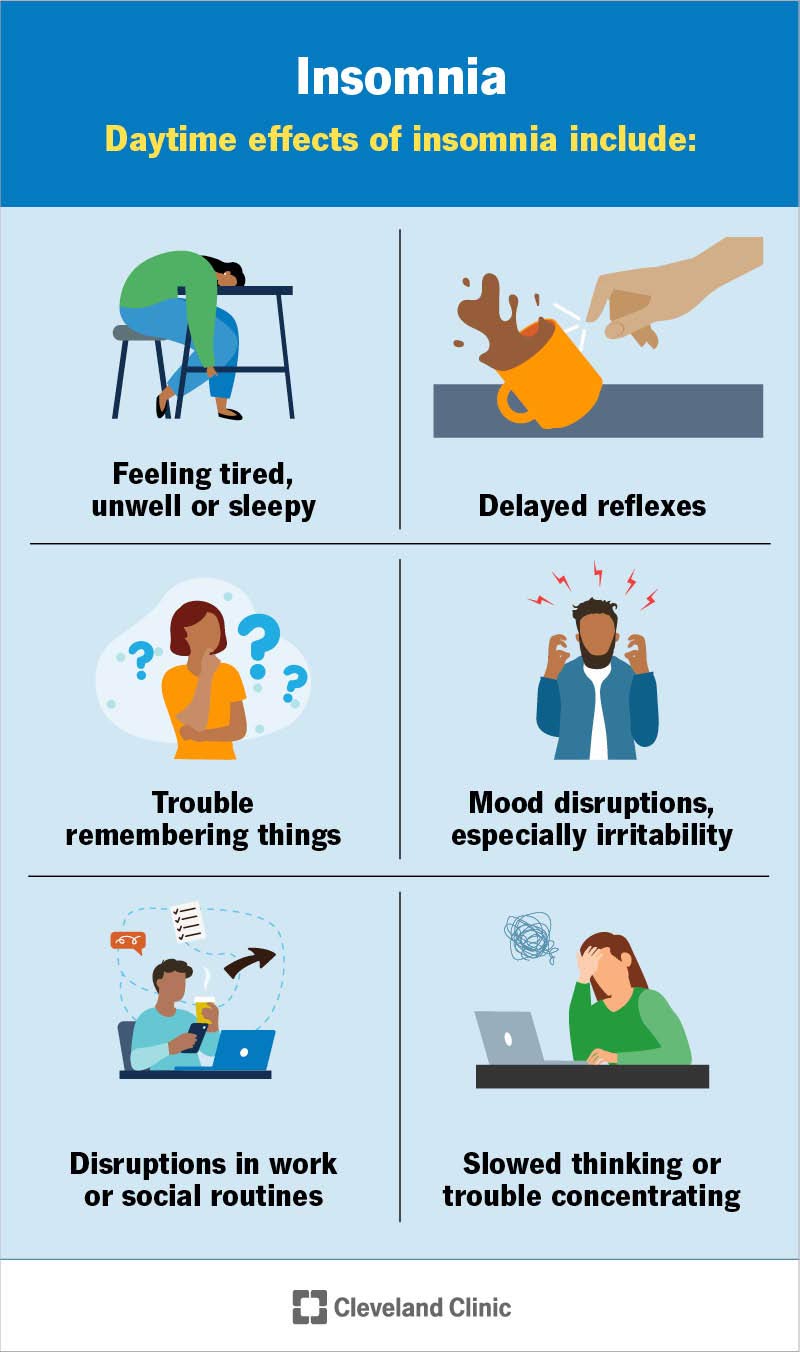Insomnia is when you experience disruptions in how you feel or function because you aren’t sleeping well or sleeping enough. About 10% of the world’s population experiences insomnia that qualifies as a medical condition. There are many ways to treat it, including talk therapy and medications.
Advertisement
Cleveland Clinic is a non-profit academic medical center. Advertising on our site helps support our mission. We do not endorse non-Cleveland Clinic products or services. Policy
Insomnia is a sleep disorder that makes it hard to fall asleep or stay asleep throughout the night. For some people, insomnia is an inconvenience. For others, it can be a major disruption. It has several causes.
Advertisement
Cleveland Clinic is a non-profit academic medical center. Advertising on our site helps support our mission. We do not endorse non-Cleveland Clinic products or services. Policy
Roughly, 1 in 3 adults worldwide have insomnia symptoms. About 10% of adults have chronic (long-term) insomnia, which lasts at least three months.
Your body needs quality sleep for many reasons. When you don’t sleep enough, it can cause sleep deprivation. This can keep you from functioning at your best. Let your healthcare provider know if you have insomnia symptoms. Treatment can help you get better rest.

Image content: This image is available to view online.
View image online (https://my.clevelandclinic.org/-/scassets/images/org/health/articles/12119-insomnia)
Insomnia has several potential symptoms, including:
Experts don’t fully know why insomnia happens. But they think it involves many factors. Some of the factors that could cause or contribute to it include:
Advertisement
Insomnia is more likely to affect you if you:
When insomnia is severe or lasts a long time, it causes sleep deprivation. A major concern with this is daytime sleepiness. It can be dangerous if you’re driving or doing other tasks that require you to be alert and attentive.
Sleep deprivation can also increase the risk of certain conditions, like:
A healthcare provider will ask you about your health history, sleep habits, symptoms and more. They may also recommend certain tests to rule out other conditions. These tests may include:
To receive a chronic insomnia diagnosis, your symptoms must have these characteristics:
Video content: This video is available to watch online.
View video online (https://cdnapisec.kaltura.com/p/2207941/sp/220794100/playManifest/entryId/1_chhlxkvp/flavorId/1_5f3sgelj/format/url/protocol/https/a.mp4)
Sleep specialist Nancy Foldvary-Schaefer, DO, explains insomnia and the many ways it can be treated.
The main treatment approaches for insomnia include:
In general, your healthcare provider is the best person to tell you about your options and what they recommend. They can also explain possible side effects of medications.
Cognitive behavioral therapy for insomnia (CBT-I) is the first-line treatment for insomnia. The purpose of CBT-I is to identify behaviors, thoughts, beliefs and emotions that may be keeping insomnia going. A healthcare professional then finds strategies that will help address these issues.
It typically involves six to eight sessions. It may be individual or group therapy. CBT-I can be led by psychologists who specialize in behavioral sleep medicine, therapists or other medical professionals.
Examples of strategies that may be part of CBT-I include:
Advertisement
Many types of medications can help you fall or stay asleep. Medications that treat insomnia may not help everyone. Some medications can interact with others, and your overall health plays a role, too.
Certain herbs or supplements can help treat insomnia. But it’s best not to assume that an herb or supplement is automatically safe for you. Talk to a provider before taking them. That helps you avoid possible side effects or interactions.
Examples of insomnia medications include:
See your healthcare provider if treatment isn’t helping with your insomnia symptoms. Reach out to them if your symptoms get worse or if you have medication side effects.
Occasional insomnia usually isn’t a major concern. You may feel tired or not your best the next day. Chronic insomnia is disruptive. Without treatment, it can lead to certain health problems. And it can greatly affect your quality of life.
Ever wish you could just push a button to fall asleep — and stay asleep? Maybe it’s time to talk to your healthcare provider. Insomnia can take a big toll on your mind and physical health. But there’s hope. Behavioral interventions and medications can help you get the quality sleep you need.
Advertisement

Sign up for our Health Essentials emails for expert guidance on nutrition, fitness, sleep, skin care and more.
Learn more about the Health Library and our editorial process.
Cleveland Clinic’s health articles are based on evidence-backed information and review by medical professionals to ensure accuracy, reliability and up-to-date clinical standards.
Cleveland Clinic’s health articles are based on evidence-backed information and review by medical professionals to ensure accuracy, reliability and up-to-date clinical standards.
Insomnia makes it hard to get the restful sleep you need to function well the next day. Cleveland Clinic sleep experts can help your body get the sleep it needs.
